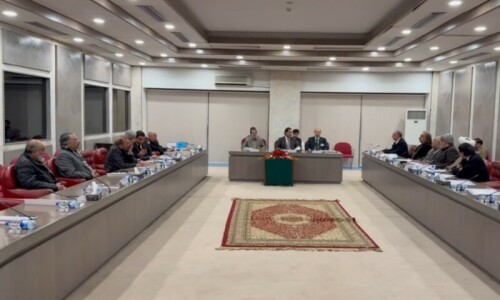
Perhaps the earliest fictional treatment of Partition by a Bangladeshi writer was the short story ‘The Escape’ written in English by Syed Waliullah (1922-1971) and included in the Pakistan PEN Miscellany (1950). The locale is unspecified but can be taken to be North India, though it could be on either side of the newly drawn border, and the action takes place on a train, an iconic emblem of hope and horror in that region. Except for the detail of a skull cap on someone’s head there is nothing to indicate the religious affiliation of the passengers, thus lending the story greater universality.
Novels
The first Bangladeshi novel dealing with Partition is Ranga Prabhat (1957) by Abul Fazl (1903-1983). Two novels which focus on the anxieties and social tensions in the decades leading up to Partition, are Alauddin Al Azad’s Kshudha O Asha (1964) Sardar Jainuddin’s Anek Suryer Asha (1966).
A much more ambitious novel is Shahidullah Kaiser’s Shangshaptak (1965). Kaiser (1927-1971) was not only Marxist-inspired; he was a card-carrying member of the Communist Party at a time when it was an underground organisation. The Communist Party of undivided India, though opposed to the dismemberment of the subcontinent, advised members to accept it as an inexorable historical reality and to carry on party activities in whichever country they happened to have their domicile. Kaiser therefore views Partition as a historical accident within the broad dialectical play of social forces and classes. His protagonist Zahed starts off as a committed Muslim League activist but turns later into a communist. The conflicts that led to partition give way to other conflicts, between West and East Pakistan, while the inherent class conflicts continue to impact on people’s lives.
Abu Rushd’s Nongor (1967), is the work of a West Bengali Muslim who chooses to move to (East) Pakistan. It may be described as bourgeois realist fiction depicting the existential choices of a protagonist, Kamal, who is in many ways the author’s persona.
Nostalgia is a powerful theme in Partition-related fiction from West Bengal, but not in Bangladeshi works. And so, when Taslima Nasreen forays into this theme it is with a Hindu migrant to India who visits her old home in Fera (1993). Her protagonist Kalyani comes back to Mymensingh only to be dismayed at the changes that have overtaken the place and the society.
Akhteruzzaman Elias (1943-1995) has produced a novel of epic proportions in Khoabnama (1997). Supriya Chaudhuri in her essay ‘The Bengali Novel’ describes it as ‘possibly the greatest modern Bengali novel’, a prose epic spanning a vast and diverse timeline and creating a distinctive kind of magic realism drawing on ‘indigenous traditions of folk narrative, memory and legend, as on subaltern history’.
Short stories post 1971
A short story in English, Khademul Islam’s ‘An Ilish Story’, published in the Bangladeshi journal Six Seasons Review, presents a scene in a middle-class Bengali home in Dhaka in the aftermath of the independence war of 1971.
Mahmud Rahman’s short story collection, ‘Killing the Water’ (2010), includes a few pieces that sketch in the Partition as an unavoidable backdrop. Tahmima Anam’s debut novel, A Golden Age (2007), links up Partition with the 1971 war through the family of ‘Rehana Ali of Calcutta’.
Anthologies
An anthology of graphic narratives issued in 2013, This Side That Side: Restorying Partition, curated by Vishwajyoti Ghosh, brings together the attempts of writers and artists from Pakistan, India and Bangladesh to deal with the existential spin-off of the event. Six of the 28 stories are by Bangladeshis. Mahmud Rahman’s ‘Profit and Loss’ is an autobiographical sketch moving from the Partition and the problems that came in its train to the 1971 war. Khademul Islam’s ‘The Exit Plan’ narrates the adventure of escaping from Pakistan where he would have been incarcerated as an undesirable alien. M. Hasan’s ‘Making of a Poet’, Syeda Farhana’s ‘Little Women,’ and Sanjoy Chakraborty’s ‘An Afterlife’, delve into facets of the identity crisis in our fractured subcontinent.
Last year Lexington Books, USA, published Revisiting India’s Partition: New Essays on Memory, Culture, and Politics, edited by Amritjit Singh, Naini Iyer, and Rahul K Gairola; it includes two essays by Bangladeshis, Md Rezaul Haque (on ‘The Case of Hasan Azizul Huq.) and myself (‘Partition and the Bangladeshi Literary Response’.
The seventieth anniversary of Partition will witness the publication of an anthology, Looking Back: India’s Partition Seventy Years On, edited by Debjani Sengupta, Tarun K. Saint and Rakshanda Jalil.
—The Daily Star / Bangladesh
Published in Dawn, August 30th, 2017














































Dear visitor, the comments section is undergoing an overhaul and will return soon.